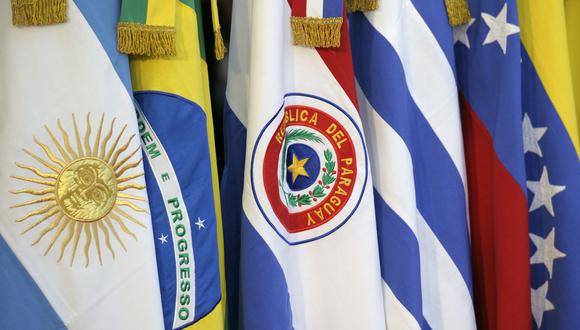RIO DE JANEIRO, BRAZIL – The tension in the discussions was such that when Argentina’s president Alberto Fernández found himself alone, he seemed visibly offended and retorted to the rest of his partners: “If we have become a burden I am sorry, the easiest thing to do is to get off the boat.”

Brazil, Uruguay and Paraguay confronted Argentina by asking for greater flexibility in negotiating trade agreements during a tense summit of presidents of the Southern Common Market (Mercosur) organized in Buenos Aires to commemorate the bloc’s 30th anniversary.
Brazil’s President Jair Bolsonaro, Uruguay’s President Luis Lacalle Pou and Paraguay’s President Miguel Abdo Benítez called for “flexibility” in the bloc’s dynamics. But the Argentine president, who chaired the meeting, made it clear from the outset that he does not want to see a generalized reduction in the common external tariff.
“We do not believe that a linear reduction of the external tariff is the best instrument. Argentina proposes to preserve the balance between agricultural and industrial sectors, with social justice, in a context of absolute global uncertainty,” said Fernández.
The Brazilian president was blunt: “Brazil wishes to count on the support (of its partners) to continue expanding the network of international trade negotiations, with the updates of the external tariff. We need to attract investments. We urgently need to overcome the great damage caused by the pandemic.”
In agreement with this idea, Lacalle Pou stated: “We are not satisfied. We agree to review the tariff. We have to move forward in negotiations with other blocs. The agreement with the European bloc has been worked on for a long time. We have to open up this process. We propose to make it more flexible” in the external negotiations.
The tension worsened when Lacalle Pou said precisely that Mercosur “cannot be a burden” or “a corset” that prevents his country’s commercial progress. Fernández, visibly upset, said “If we are a burden, I am sorry. Perhaps the best thing is to get off the boat.”
Mercosur does not allow its members to negotiate separate trade agreements without the authorization of other member countries. This is precisely what Uruguay and Paraguay have been demanding to change for more than a decade.
In this sense, Paraguay’s Abdo advocated: “External negotiations should be joint and coordinated, but they should not be a barrier to our development. Ideologies should not contaminate”.
30 years of light and many shadows
Thirty years after the creation of Mercosur, there are several obstacles hindering negotiations with the European Union, a bloc with which Mercosur has been negotiating for two decades a trade agreement still pending parliamentary approval.
Far from that foundational Treaty of Asunción in 1991, the integration model is once again under discussion.
“A significant reduction of the Common External Tariff and a more flexible negotiation with third countries are leading to a simple free trade zone”, said Fernando Masi, analyst of ‘Mercosur abc’.
The Mercosur heads of state meeting was also attended by presidents Sebastián Piñera (Chile), as an associated state, and Luis Arce (Bolivia), in the process of full incorporation into the bloc.
In three decades, the bloc has had its ups and downs, without yet being able to establish a perfect customs union, with an external tariff perforated by exceptions, and internal asymmetries that harm the smaller economies of Uruguay and Paraguay.
There are also radical changes such as the relationship with China, which used to represent only 3% of the bloc’s external sales. Now China is the main export destination. Almost one out of every four dollars from exported goods comes from the Asian giant and it is the first source of Mercosur imports, displacing the United States, according to the consulting firm Abeceb.com.
The bloc sells 63% of the world’s soybeans, and is the world’s leading exporter of beef and chicken, corn, coffee and iron, as well as the world’s eighth largest producer of automobiles. Its combined GDP reached US$ 2.4 trillion in 2019.
Mercosur has almost 300 million inhabitants and a surface area of nearly 15 million square kilometers, similar to the size of Russia.
Source: Gestion.

